Search results for: 'roman bronze'
-
 Roman intaglio with Eros
Roman intaglio with ErosThe skillful work shows the god Eros as a boy. Nice orange glass paste, imitating carnelian.
Price: on request Roman intaglio with goat
Roman intaglio with goatRoman jewellery insert made of light blue glass paste, imitating Nicolo. It shows a he-goat with a smaller animal in front of it.
Price: on request Roman intaglio with cow
Roman intaglio with cowRoman jewellery insert made of transparent orange glass paste. The motif is a cow. From the Professor Brosch collection of engraved gems.
Price: on request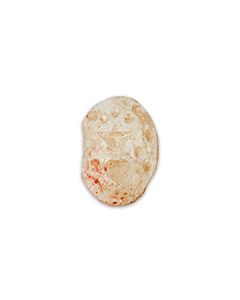 Roman intaglio with mixing vessel for wine
Roman intaglio with mixing vessel for wineThe Roman glass paste shows a tall vase surrounded by vine leaves. It is a mixing vessel for wine.
Price: on request Roman intaglio with horse
Roman intaglio with horseRoman jewellery insert made of transparent orange glass paste with a white bands. The motif is a horse. From the Professor Brosch collection of engraved gems.
Price: on request Roman intaglio with griffin
Roman intaglio with griffinThe Roman decorative insert made of orange glass paste shows a mythical creature with a horse's body and an eagle's head, leaning on its front paws.
Price: on request Dark Roman glass paste with white band
Dark Roman glass paste with white bandThe Roman ring insert is in excellent condition. The small-format motif is not clearly identifiable, but it may show a head.
Price: on request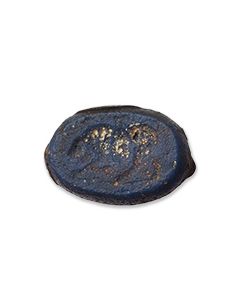 Roman intaglio with cow
Roman intaglio with cowRoman jewellery insert made of opaque blue glass paste. The motif is a cow. From the Professor Brosch collection of engraved gems.
Price: on request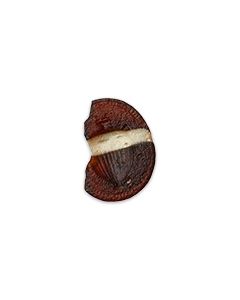 Roman intaglio with vase
Roman intaglio with vaseThe Roman ring insert is made of beautiful dark purple glass paste with a white band. It shows a bulbous vase with taeniae.
Price: on request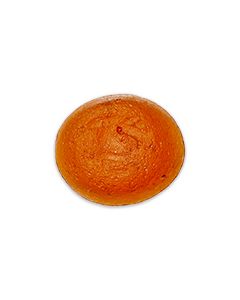 Roman intaglio
Roman intaglioNice orange, translucent glass paste, imitating carnelian. From the Professor Brosch collection of ancient gems.
Price: on request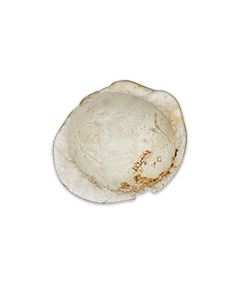 Roman intaglio with bull
Roman intaglio with bullThe Roman ring insert is made of colourless glass paste that imitates rock crystal. It depicts a jumping bull.
Price: on request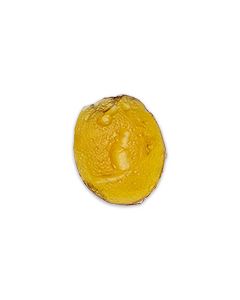 Roman intaglio with bird
Roman intaglio with birdThe glass paste shows a bird on a branch. From the Professor Brosch collection of ancient gems.
Price: on request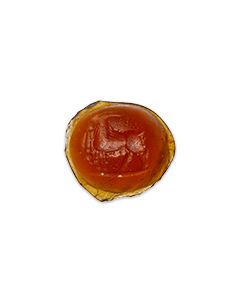 Roman intaglio with billy goat
Roman intaglio with billy goatThe Roman ring insert is made of orange glass paste that imitates carnelian. It depicts a horned quadruped.
Price: on request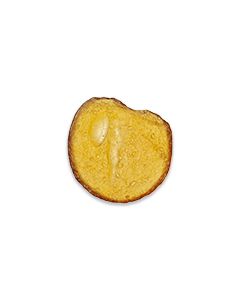 Roman intaglio with young man and shield
Roman intaglio with young man and shieldLight orange glass paste showing a young man holding his round shield to the side.
Price: on request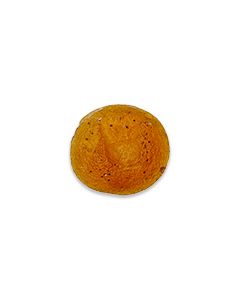 Roman intaglio
Roman intaglioNice orange, translucent glass paste, imitating carnelian. From the Professor Brosch collection of ancient gems.
Price: on request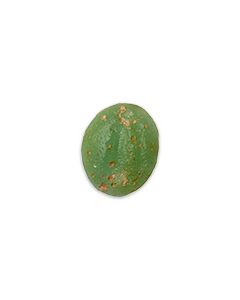 Roman intaglio
Roman intaglioBright green glass paste with standing figure. From the Professor Brosch collection of ancient gems.
Price: on request Roman wall painting
Roman wall paintingThe fresco shows a young man in full military gear. Interpretations include Mars, the god of war, and Brutus, the murderer of Caesar. The impressive piece is an absolute rarity in its outstanding condition and quality.
Price: on request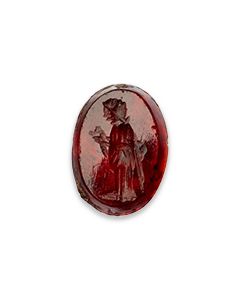 Roman intaglio of carnelian
Roman intaglio of carnelianThe gem stone from the Late Roman Imperial period is engraved in linear style. It shows a standing person in a cloak.
Price: on request Augustus denarius from Wishanger hoard
Augustus denarius from Wishanger hoardFound 2021 in East Hampshire, UK. Revers showing Gaius and Lucius, the sons of M. Agrippa. The hoard is a very impressive proof of the fact that coins were in circulation for up to several centuries in the Roman era.
Price: on request Julius Caesar Denarius from Wishanger hoard
Julius Caesar Denarius from Wishanger hoardFound 2021 in East Hampshire, UK. The hoard is a very impressive proof of the fact that coins were in circulation for up to several centuries in the Roman era.
Price: on request Vespasian denarius from Wishanger hoard
Vespasian denarius from Wishanger hoardThe reverse shows the urn of Vespasian on a column. Great patina. Found 2021 in East Hampshire, UK. The hoard is a very impressive proof of the fact that coins were in circulation for up to several centuries in the Roman era.
Price: on request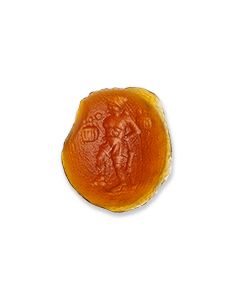 Roman intaglio with Odysseus as a beggar
Roman intaglio with Odysseus as a beggarThe roman intaglio shows an important scene from the Odyssey in which Odysseus returns home after his long journey. The hero is disguised as a beggar. He wears his pilos hat and is resting his weight on a stick.
Price: on request Roman intaglio with Calydonian boar hunt
Roman intaglio with Calydonian boar huntNice ring insert made of composite glass. Its imprint shows the moment of the mythological boar hunt in which Meleager slays the beast.
Price: on request Roman intaglio with Ganymede and eagle
Roman intaglio with Ganymede and eagleThe dark glass paste symbolizes a famous love affair from ancient mythology. The sky father Zeus falls in love with the beautiful Ganymede, a Trojan king's son.
Price: on request Roman intaglio with hippocampus
Roman intaglio with hippocampusBeautiful depiction of the popular mythical creature from Greek and Roman art. The orange glass paste copies an engraved carnelian gem. From the Roman period.
Price: on request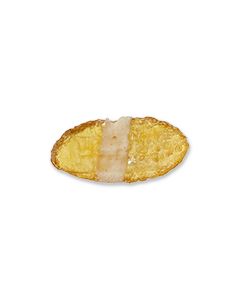 Roman intaglio
Roman intaglioRing insert made from beautiful, bright yellow glass paste. From the Professor Brosch collection of ancient gems.
Price: on request Roman sandal sole type fibula
Roman sandal sole type fibulaDie Form wird in der Literatur als Schuh- oder Sandalensohle bezeichnet. Der sehr dekorative Fibeltyp war extrem beliebt und im zweiten Jahrhundert weit verbreitet. Er stammt aus den nördlichen römischen Provinzen.
Price: on request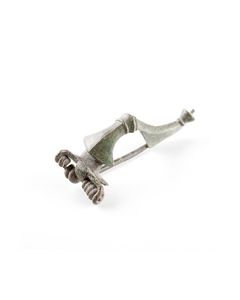 Römische Kräftig Profilierte Fibel
Römische Kräftig Profilierte FibelFibeltyp der späten römischen Kaiserzeit, sogenannte kräftig-profilierte Fibel. 1. bis Mitte 3. Jh. n. Chr., 66mm lang, in museumswürdiger Erhaltung.
Price: on request Brooch from Roman Britain
Brooch from Roman BritainThis rare variant of the T-shaped brooches was found in Lechlade, Gloucestershire. It dates to the 1st or 2nd century AR. From the famous Hattatt collection and published in two standard works for ancient fibulae.
Price: on request Roman seal box with phallus
Roman seal box with phallusCircular body with protective phallus in high relief on the lid. A piece from the Roman Imperial period, found in North East England. Published in a standard work by Richard Hattatt.
Price: on request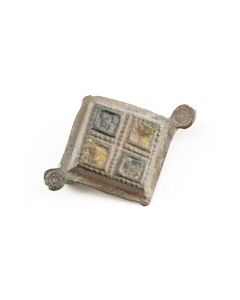 Impressively preserved enameled Roman brooch
Impressively preserved enameled Roman broochIn Britannien und Gallien produzierter Fibeltyp des zweiten Jahrhunderts. Edel patinierte Bronzeoberfläche. Besonders hervorzuheben ist die Emailauflage in selten gutem Erhaltungszustand.
Price: on request Dolphin brooch from Roman Britain
Dolphin brooch from Roman BritainThe so-called dolphin brooch is very British. This specimen was probably made by the Celtic Corieltauvi tribe, shortly after the arrival of the Romans in the middle of the 1st century. Published in two works by Richard Hattatt.
Price: on request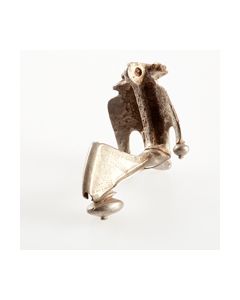 Kräftig profilierte Silberfibel, 2. bis 3. Jh. n. Chr.
Kräftig profilierte Silberfibel, 2. bis 3. Jh. n. Chr.Römische Fibel vom Typ der kräftig profilierten Fibeln. Massives Silber, 34,2g, 100 bis 250 n. Chr. Museumswürdiger Zustand.
Price: on request Römische Silberfibel aus Pannonien
Römische Silberfibel aus PannonienGewandnadel vom Typ der kräftig profilierten Fibeln bzw. der Trompetenfibeln. Spezifische Variante der Jahre 200 bis 250 n. Chr. aus den pannonischen Provinzen.
Price: on request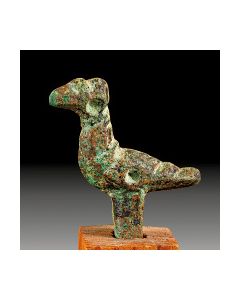 Bronze bird from Late Antiquity
Bronze bird from Late AntiquityFinial in the shape of a bird, probably once the head of a rod or distaff. From the Late Roman or Early Byzantine period.
Price: on request Provinzialrömische Fibel, Swastika
Provinzialrömische Fibel, SwastikaRömische Fibel aus Bronze, Swastika-Form, mit tierförmigen Enden aus stilisierten Pferdeköpfen. Soldatenfibel des 3. bis 4 Jh. n.Chr., Balkan-Raum.
Price: on request

